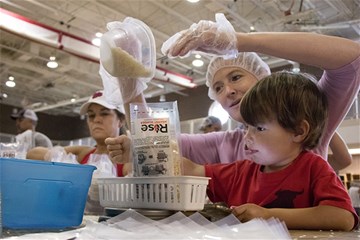When volunteers at Dunwoody United Methodist Church in metro Atlanta finish packing meals for children in need, the Aug. event set a new record for the church and for the denomination.
One of many congregations that work in partnership with United Methodist-related Rise Against Hunger (formerly Stop Hunger Now), the church has built its annual "Foodstock" into a community tradition. Simpsonwood United Methodist Church in Norcross, Georgia, is a co-sponsor.
Before the day ended, United Methodists across the denomination was responsible for packing more than 100 million Rise Against Hunger meals.
That's nearly a quarter of the more than 400 million dehydrated nutritious meals that have been distributed by Rise Against Hunger to partners in 74 countries. The internationally packaged meals, in a total of 36 countries, use food that is locally sourced, the organization says. In 2017, the organization served 1.4 million peopleand, in addition to meals, distributed $26.1 million in in-kind gifts. Contributors also include corporate and community partners.
Dunwoody's goal on Aug. 11 was to package more than 300,000 meals and increase its own long-running total to the count to 2.5 million.
Rise Against Hunger's mission resonates with Dunwoody's own focus on hunger issues, explained the Rev. Jenna Kennedy, associate minister, and the way the meal-packing program is set up makes it easy for the church to host a multigenerational, accessible event, she said. "Any person of any ability can be here … any walk of life and age of life.
For Sean Taylor and Wade Hatcher, lay members at Dunwoody who co-founded the event in 2012, the bottom line is bringing glory to God while having the opportunity to provide a better quality of life for hungry children.
The Rev. Ray Buchanan — the United Methodist pastor who started what was then called Stop Hunger Now after working on food insecurity in the U.S. through the Society of St. Andrew — knew the food-packaging model would appeal to his denomination. Many of the meals are shipped to partner schools to distribute to their students.
For volunteers and event organizers, Rise Against Hunger's appeal is both emotional and practical, Buchanan noted. There is "the immediacy of packing those meals and knowing that the next time those bags will be opened will be to feed hungry children," he said, combined with the efficiency of a turn-key operation. "We can be in and out in four hours."
At Dunwoody, that resonates with Taylor, who sees Foodstock as a way to reach busy families, couples and individuals with limited time. "You can come in and be part of a two-hour shift … and feel very rewarded," he said. "It's a high-energy, happy atmosphere."
In South Africa, unlicensed child care facilities who receive the prepackaged meals can earmark money that would be spent on food toward the costs of getting government certification, he said. In the Philippines, Rise Against Hunger has hired several hundred local farmers to grow what is needed for meal production.
Linda Bloom, assistant news editor, UMNS
One of seven apportioned giving opportunities of The United Methodist Church, the World Service Fund is the financial lifeline to a long list of Christian mission and ministry throughout the denomination. Through the Four Areas of Focus churches are Engaging in ministry with the poor with their communities in ways that are transformative.





